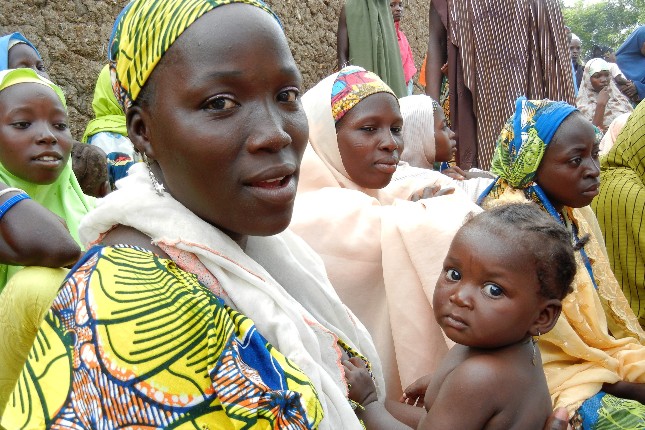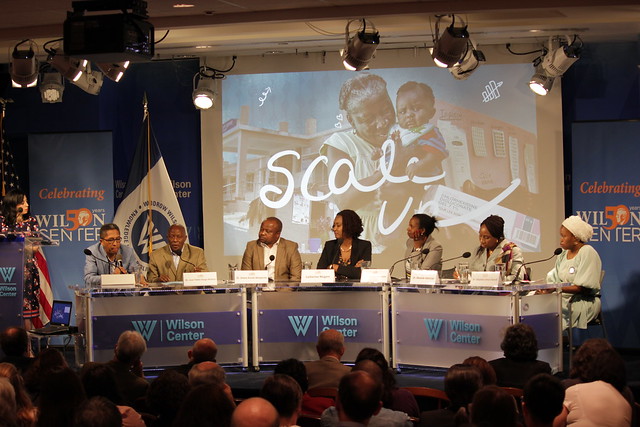-
Scaling Up Global Healthcare for Women, Children, and Families
May 31, 2018 By Julianne Liebenguth
“We are seeing increasingly self-reliant countries develop national health sector plans solidly grounded on technical evidence,” said Dr. Jim Ricca of the United States Agency for International Development (USAID)’s flagship Maternal and Child Survival Program (MCSP) at a recent Wilson Center event. Expanding successful reproductive, maternal, newborn, child, and adolescent healthcare (known as RMNCAH) interventions to the national level could make a significant contribution to meeting the 2030 Sustainable Development Goals for mortality reduction, he said.
Evidence-Based Interventions
To scale up maternal and newborn healthcare, countries need to bolster interventions that have already accumulated “enough evidence to get a ‘go’ signal from country decision-makers for scale-up efforts, but are not yet part of routine practice,” said Dr. Ricca, such as improving water sources, using the antiseptic Chlorhexidine, vaccinating against rotavirus, and managing sepsis.
Most likely, these efforts will “take place over years in a complex and not completely predictable environment,” said Dr. Ricca, “where critical features of [the] landscape might change, like the political or economic situation.” Therefore, strategic, evidence-based planning is critical for achieving positive, timely, and widespread results.
Local evidence, for example, provided the impetus for successfully scaling up Chlorhexidine in Nigeria, said Dr. Abosede Adeniran, Director of the Child Health Division for Nigeria’s Federal Ministry of Health. When applied to the umbilical cord, Chlorhexidine can reduce severe infection by 68 percent and mortality by 23 percent, potentially saving more than 300,000 lives each year.
After the success of two community-based, statewide distributions programs—in Sokoto and Bauchi—the Nigerian government launched the National Strategy for Scale-Up of Chlorhexidine. “We’ve been able to make some remarkable progress with the federal government providing the strategic direction,” said Dr. Adeniran. “We do not want to lose that momentum.”
Sustaining Success
“There’s a tendency in this kind of world to focus on the introduction phase of something, and not necessarily on the continuation phase,” said Larry Cooley, President Emeritus of Management Systems International. To sustain impact, efforts to scale-up healthcare must take on a long-term, systemic approach that is particularly sensitive to private-sector incentives. Program designers need to ask: “What’s the funding necessary to get something on stream? And what’s the funding necessary to sustain it over time?” said Cooley.
Ideally, this systemic approach should also involve a broad spectrum of stakeholders, including those outside the global health sector, said Laura Ghiron, Vice President of Partners in Expanding Health Quality and Access. Programs that partner with external agencies—such as the ministry of planning, the ministry of finance, and private sector organizations—“have a much better chance of moving-ahead in lock-step and having the funds available,” said Ghiron.
To be sure, “one cap does not fit all,” said Dr. Stephen Hodgins, Associate Professor for Global Health at the University of Alberta and Editor-in-Chief of Global Health: Science and Practice. Consequently, “it is important to understand the scale-up environment where you’re introducing your intervention,” he said.
Dr. Hodgins advocates for a two-tiered, “looped” learning approach that prioritizes adaptability and reflexivity. “Single loop learning” involves closely monitoring and evaluating implementation issues—such as interruptions in the supply chain—and making adjustments when necessary. Whereas, Hodgins explained, “double loop learning” involves re-examining the underlying assumptions and causal models of a scale-up project to determine if and when a completely new strategy is required.
Country Stories: Rwanda and the Democratic Republic of the Congo
In the Democratic Republic of the Congo (DRC), the expansion of community case management has dramatically reduced childhood illnesses such as malaria, diarrhea, pneumonia, and malnutrition. Since 2005, the DRC has trained more than 14,000 healthcare professionals on integrated management of these diseases, ultimately affecting more than 10 million people across all 26 provinces, said Dr. Jean Fidèle Ilunga Mubayi of the DRC’s Ministry of Health.
“For the very first time, the national budget of the Congolese government has a specific line dedicated to supporting maternal and child health,” said Dr. Ilunga. Synergistic partnerships are pivotal in achieving and maintaining such positive results, he said. “Some [partners] provide support through training and supervision; others help with procurement of drugs and commodities, and others implement supporting programs, such as result-based financing.”
Rwanda implemented postpartum family planning interventions by collaborating with technical working groups that specialize in data collection and measurement, said Dr. Jacqueline Umunyana, Senior Program Learning and Scale Up Advisor for MCSP Rwanda. These and other MSCP-supported interventions ultimately expanded into 10 districts and contributed to the steady decrease of birth asphyxia, which had previously been the leading cause of neonatal death in Rwanda.
Where There’s a Will, There’s A Way
Despite significant advancements in newborn and maternal health in Nigeria and Rwanda, both Dr. Umunyana and Dr. Ilunga pointed to several issues that need critical attention moving forward, including making healthcare more accessible in remote locations, developing leadership at multiple political levels, and using data at the operational level.
Though many scale-up projects will inevitably encounter shocks and stresses along the way, “if you have an adapted learning approach, then you can make things work,” said Dr. Koki Agarwal, MCSP Director. “Our country teams have demonstrated that where there’s a will, there’s a way,” she said. “And the country examples show us very clearly that they can, and they are.”
Sources: Global Financing Facility; Healthy Newborn Network; John Snow Incorporated; Maternal and Child Survival Program; United Nations Development Programme; United States Agency for International Development
Photo Credit: A woman attends a health education session in northern Nigeria, January 2013, courtesy of the UK Department for International Development
For more photos from this event, see our Flickr album.
 A Publication of the Stimson Center.
A Publication of the Stimson Center.




